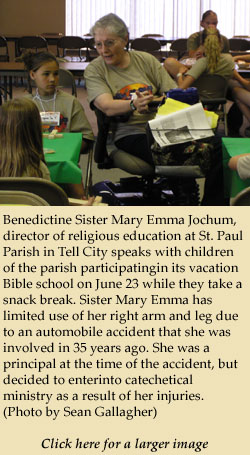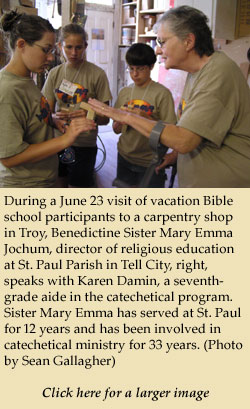2005 Religious Education Supplement
Benedictine sister finds vocation in
religious education after tragic accident
By Sean Gallagher
 TELL CITY—Benedictine Sister Mary Emma
Jochum, the director of religious education (DRE) at
St. Paul Parish in Tell City, has been a nationally recognized
leader in catechesis for more than 30 years.
TELL CITY—Benedictine Sister Mary Emma
Jochum, the director of religious education (DRE) at
St. Paul Parish in Tell City, has been a nationally recognized
leader in catechesis for more than 30 years.
During that time, she has planted seeds of faith in
countless children, welcomed adults into the Church
through the Rite of Christian Initiation of Adults (RCIA)
and served as a mentor to several of her colleagues in
parish catechetical ministry.
But this legacy of service might not have happened if
a turning point in her life had not occurred on Oct. 8,
1970.
On the evening of that day, Sister Mary Emma, who at
the time was the young principal of Holy Cross School in
Haubstadt, Ind., in the Diocese of Evansville, was delivering
some standardized tests to a principal of a nearby
school. It was raining at the time when she approached a
one-lane bridge.
Sister Mary Emma misjudged the speed of an oncoming
car, braked quickly and lost control of her small car.
It tumbled down a 27-foot embankment into a ditch and
landed on its roof.
Three vertebrae in her neck were buckled and in the
process several nerves in her spinal chord were severed.
At a hospital in Evansville, doctors told Sister Mary
Emma’s parents and her prioress that she would either not
survive surgery or would be bound to a wheelchair for
the remainder of her life.
Sister Mary Emma remained in the hospital for more
than four months. During much of that time, she was
immobilized on a bed so narrow that panels on the side
were attached for her to rest her arms.
Her head was held in place by tongs that were attached
to screws that were drilled into her skull and re-tightened
daily.
The bed was constructed so that it could be rotated
upside down. This happened every two hours for the first
two months of Sister Mary Emma’s hospital stay.
Being totally secured on this bed for so long, Sister
Mary Emma sought meaning in the one part of her that
could continue to move—her heart, formed by her faith-filled
family and years of religious life.
“Many a time when I was lying there, I thought that
this is the cross of Christ,” she said. “And then the tongs
that tugged, I just related that to the crown of thorns. It
didn’t take me long to experience that myself. With every
resurrection, there is a cross and a death.”
 Sister Mary Emma experienced something of a death
on that October evening in 1970. But the beginnings of a
new life emerged a month later when she felt a movement
in her left foot.
Sister Mary Emma experienced something of a death
on that October evening in 1970. But the beginnings of a
new life emerged a month later when she felt a movement
in her left foot.
"When I felt that movement, I asked the nurse, when
she came in, whether or not that really was my imagination
or I was really moving it,” she said. “And she was
ecstatic. She was so surprised because I was supposed to
be paralyzed from the neck on down.”
By Christmas, Sister Mary Emma was able to sit up.
She then entered into months of strenuous physical therapy.
She was released from the hospital in mid-February,
but lived in a nearby convent to facilitate her out-patient
therapy.
Moving with the aid of a walker, Sister Mary Emma
returned to Holy Cross School and finished the academic
year she had begun before her accident.
A year later, she concluded that the physical demands
of being a principal were too much for her. She had
regained the use of her left arm and leg, but her right leg
was effectively immobile and the use of her right hand
was limited.
It was at that point, in the spring of 1973, that Sister
Mary Emma discerned a call to catechetical ministry. She
soon became the director of religious education of
St. Clement Parish in Booneville, Ind., in the Evansville
Diocese, and served in that position for nine years.
In the ensuing years, she earned a master’s degree in
religious studies and was a diocesan catechetical leader in
the Evansville Diocese.
By the time she began her ministry in the rchdiocese
in 1993, Sister Mary Emma had 20 years of catechetical
ministry under her belt.
According to Harry Dudley, associate
executive director for faith formation in the archdiocesan
Office of Catholic Education, she has benefited
DREs across the archdiocese.
“She’s seen as sort of a senior member of the cadre of
DREs,” he said. “They look to her for ideas and input and
suggestions. When she’s giving her input, I’m amazed at
how well she understands the differing deaneries.”
The recognition that Sister Mary Emma has earned
from her archdiocesan colleagues has been echoed on the
national level. In 1998, she was the recipient of the
National Conference of Catechetical Leadership’s
Distinguished Service Award.
But soon after this, Sister Mary Emma had to call
upon the wisdom gained through her years of experience
and the determination she showed during the recovery
from her accident when her catechetical ministry at
St. Paul Parish was faced with a major challenge.
In 2000, St. Paul School was being closed. For
decades, it had been operated as a public school with
release time given during the school week
for religious education.
According to Sister Mary Emma, many
parishioners were concerned that lots of
families would not take the time to have
their children participate in a new parish
religious education program.
But as St. Paul parishioner and catechist
Sarah Chinn explained, it was
through Sister Mary Emma’s hard work
that none of the parish’s children who had
received religious education in the school
fell between the cracks.
“She had it in her mind that we were
going to continue that religious education
program and that our kids were not going
to lose anything by not having the benefit
of that release time,” Chinn said.
The parish’s RCIA has also grown
under Sister Mary Emma’s leadership.
Starting out with only three participants,
she had as many as 22 in later years.
Through this ministry to adults coming
into the Church, she has touched many
lives and inspired new catechists.
One of them is St. Paul parishioner
Patti Marcrum. She became Catholic at
the 2003 Easter Vigil and has served as
the parish’s vacation Bible school coordinator ever since.
She and her husband, who had been
Lutheran, were drawn to the Church by
Sister Mary Emma’s welcoming
approach to them when their children
were students at St. Paul School, and
they enrolled them in the religious education
release time.
Since then, Marcrum has constantly
been inspired by Sister Mary Emma.
“I don’t know how she does what she
does,” Marcrum said. “She works like
three people, and never stops smiling and
always has this amazing energy. She
knows personal things about everyone in
that parish. She knows everyone’s names
from the smallest, tiniest babies to the
oldest person there.”
Sister Mary Emma’s knowledge of the
parishioners and her concern for them has
persuaded many of them to minister
alongside her.
“I tell her all the time that she should
be in sales,” Chinn said, “because she has
the knack to find the skills of the parishioners
that we have, and she takes the
people that we have, and she molds them
into what we need.”
Sister Mary Emma has been so effective
in passing on the faith and in inspiring others
to join her in this ministry that her disability
often becomes an afterthought.
“I think, quite honestly, when most
people look and see what she’s contributed,
and see her work and then meet
her, they’re absolutely amazed because
nobody mentions that she has a disability,”
Dudley said. “There’s no need to.”
But while Sister Mary Emma hasn’t let
her disability keep her from being a
strong catechetical leader as she wheels
about the parish in a small scooter, she
acknowledged that it has shaped how she
ministers.
“I have a real feeling of compassion
for people’s struggles, regardless if
they’re physical struggles or whatever
struggles people will come to me and talk
to me about,” she said. “I just really think
that it has given me a different way to listen
and to feel their struggles because I’ve
been through those struggles.”
Still, Sister Mary Emma knows she
will not be able to keep up the rigorous
physical exercise she does daily to maintain
her mobility. But she is determined to
stay in catechetical ministry as long as
she can because she is convinced that it is
a calling.
“I think that there’s something deep
within my inmost being that calls me, that
drives me to minister to all of God’s people,”
she said. “And I see my DRE ministry
as not a job, not a career, but it has
become for me a commitment that holds
onto me instead of me holding onto it.” †

